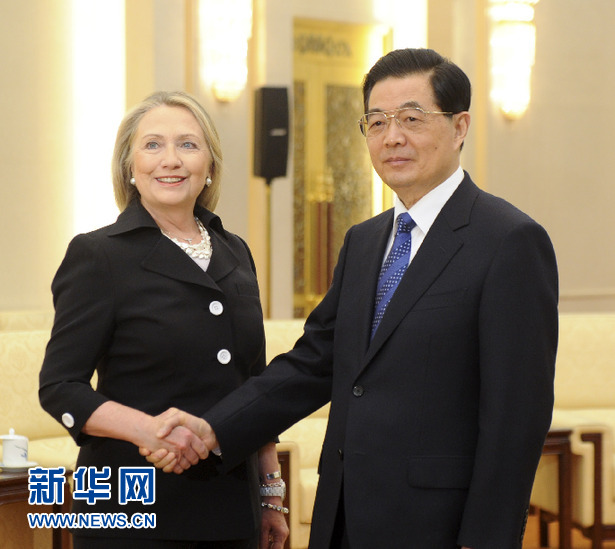US role in S. China Sea dispute: more than meets the eye
- By Catherine Wood
 0 Comment(s)
0 Comment(s) Print
Print E-mail China.org.cn, September 5, 2012
E-mail China.org.cn, September 5, 2012
|
|
|
Chinese President Hu Jintao met with U.S. Secretary of State Hillary Clinton at the Great Hall of the People on Wednesday morning. |
China is entangled in what seems to be its second island dispute of the year. Currently, China asserts sovereignty over islands in the South China Sea that have shared claims from the Philippines, Vietnam, Malaysia, and Brunei. The resource-rich islands (including Scarborough Shoal, or Huangyan Island as called in China) are critically important for maritime commerce and are considered vital to future trade throughout the region.
Arriving Tuesday in Beijing as part of her Asia-Pacific tour, US Secretary of State Hillary Clinton believes progress can be made on the issue before the next East Asia Summit. According to a US state department transcript, Clinton said she considered a peaceful settlement of the dispute to be of great importance to the Obama administration.
"The US has a national interest...in the maintenance of peace and stability, respect for international law, freedom of navigation, and unimpeded lawful commerce in the South China Sea," Clinton said.
Although Clinton did not directly criticize China on the issue, she hinted unease regarding China's diplomatic actions, maintaining that no country should use coercive or intimidating steps to settle the dispute. Any outcome should be cooperative and democratic in nature, she asserted, adding that the US is prepared to play a "steady outside role" in a peaceful resolution.
Concerned about rising territorial tensions in the area, the US is pushing for a multilateral solution to the South China Sea unrest. Clinton urged ASEAN (Association of South East Asian-Nations) member-nations to work towards formulating policy that would settle regional territory disputes. Consequently, China has adopted a bilateral approach to resolving conflicts ― a tactic that experts say may put pressure on countries China has economic ties with.
Chinese officials, meanwhile, questioned why the US is concerning itself with a land issue that does not involve US territory. China's Foreign Ministry spokesman, Hong Lei, has asked that "countries outside this region should respect the choice of the countries directly concerned with the issue and should earnestly honor their commitment of not taking sides in the dispute."
The US has pointed to Indonesia to lead the conflict resolution efforts. "The world looks to Indonesia as the leading democracy in the region and being the third-largest democracy in the world to promote democracy and human rights," Clinton said. The US has increased relationships with Indonesia over the last few years, in part because of Obama's close personal ties with the country.
ASEAN's Secretary General Surin Pitsuwan said "the US certainly has a role to play and a contribution to make," but warned too much attention could prove counterproductive.
So is Clinton's Asia-Pacific tour really about promoting democracy and peaceful conflict resolution? This moral high ground seems to ignore all-too-obvious ulterior motives that no-one is talking about.
Real estate in the South China Sea is sharply rising in value, due to the fact that over one half of the world's cargo flows through the region. Global economies (like China) continue to be under high pressure to increase trade in a depressed market. China's manufacturing PMI (Purchasing Managers Index) fell to 47.6 this week, its lowest figure since August 2009, putting pressure on the country to boost trade volumes. Economically, the US seems to be in similar shape with its June 2012 numbers showing the weakest PMI since July 2009 (and only marginal growth in July 2012.)
Across the board, depressed economies and lack of international demand are contributing to a slump in new orders while finished inventory levels are at an all-time high.
The key to staying afloat in the coming quarters might not be in slashing prices and finding cheaper manufacturing solutions, but in finding cheaper and more strategic shipping options. Any country possessing land along a popular trade route stands to gain leverage and control over the supply chain. The logistical advantages for a country having a preeminent manufacturing sector like China would cut overhead and generate income for generations. This is the kind of analysis we see as tensions in the South China Sea continue to rise. Bearing this in mind, it becomes more obvious why third parties like the US would take an active interest in this debate.
Although agendas of peace and diplomacy are fantastic themes for the region, we should not forget that any country that directly inserts itself in an issue always has something to gain. In this case, the US [and China] see big strategic gains to be made with regard to world trade and the South China Sea; this issue is far more than a land dispute.
The author is a freelance writer currently based in Beijing.
Opinion articles reflect the views of their authors, not necessarily those of China.org.cn






